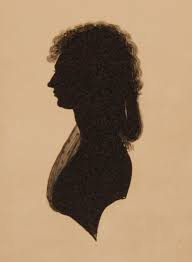I've been interested for some time in the network of artists and scientists who coalesced around the wealthy, charismatic and imposing figure of Sir Joseph Banks. Banks launched his career (which was initially as a botanist) first by voyaging to Newfoundland and Labrador to study their natural history, and then by travelling with Captain Cook, in 1768, to explore the southern seas. He later became a friend of King George 111, was instrumental in developing the botanic gardens at Kew, and, among many other interests and activities, became the President of the Royal Society (the national academy for the advancement of science).
He was very good at spotting and encouraging talent. And one of the young scientists who came to his notice was William Herschel. William was an astronomer - as was his younger sister, Caroline.
William came from a family of musicians in Hanover. He moved to England in 1757 and initially worked as a musician, first in the north and then in Bath, where he became organist at the Octagon Chapel and Director of Public Concerts. It was during this time that he invited his younger sister Caroline to come and live with him - his brother Alexander also shared the house, which is now the Herschel Museum of Astronomy.
 |
| A silhouette of Caroline as a young woman. |
 |
| The Herschels' house, now a museum. |
Caroline was seventeen when she arrived in England. She had been very close to William and must have been devastated when he left home - particularly as her mother, who really only had time for her oldest son, Jacob, neglected the child. Caroline was treated as a servant: she contracted typhoid as a child, as a result of which her growth was stunted; she was tiny, just a little over four feet tall. But things took a turn for the better when William came back to Hanover and rescued her. He taught her to play music and to sing - so well that she was offered a post with an opera company in Birmingham.
But by this time, Caroline and William were both becoming fascinated with astronomy. (I've noticed that there's often a connection between music and science, though I don't know enough about either to understand why this is.) William learnt how to grind and polish lenses, and built increasingly large telescopes which he used to sweep the night sky. Caroline was initially his recorder and note taker, but she progressed to making her own observations.
 |
| The garden behind the museum. |
One day, a friend of Banks named William Watson noticed Herschel in the street in Bath, making observations with his telescope. Intrigued, he fell into conversation with the astronomer, and later brought him to the notice of both Banks and the Astronomer Royal, Neville Maskelyne. Not long after that, Herschel discovered a new planet, which was eventually named Uranus. This caused a great stir, not just in Britain, but further afield on the continenet too. Meanwhile Caroline was making her own discoveries in the night sky: she specialised in finding comets.
In 1782, they both moved to Datchet, and initially William, but later Caroline, came to be employed as astronomers by the King. Caroline was the first woman in England to be honoured with a government position, and the first to be given a salary as an astronomer. Imagine, for a child neglected by her own mother to have achieved so much, and in a country where she arrived not knowing a word of English - it must have felt wonderful!
But there was a shadow over this period of her life. Hitherto, Caroline had worked closely with her beloved brother, and had managed his house for him too. But now, William decided to marry - and everything had to change. Fortunately, Caroline's salary, though not large, allowed her to be independent. But these were difficult years for her; so much so that she later destroyed her journals for this period.
 |
| Caroline in later life. |
But eventually, she became reconciled to the marriage, and to William's wife, Mary - and she delighted in their son, John, with whom she later collaborated when he too became an astronomer. She lived a very long life, dying at ninety eight.
The Herschels' house in Bath is now the Herschel Museum of Astronomy, and I went to visit it a few months ago. It's not that easy to find - it doesn't really advertise its presence - but it's well worth seeking out: it's quite charming, and really gives you a sense of what life was like there for Caroline and her brother. Somehow, I feel very fond of Caroline. She must have been a remarkable woman to have achieved so much, after such a difficult start, and in a time when high achievers were generally men.



